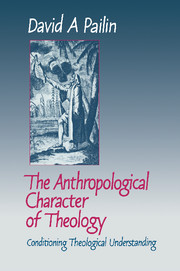Book contents
- Frontmatter
- Contents
- Preface
- 1 INTRODUCTION TO A STUDY OF THEOLOGY
- 2 FAITH, BELIEF, THEOLOGY AND REASON
- 3 GOD AS COSMIC PROJECTION
- 4 GOD AS ACTUALIZING REGULATIVE IDEAS
- 5 THEOLOGY AND RELIGIOUS EXPERIENCE
- 6 THEOLOGY AND THE APPREHENSION OF REVELATION
- 7 THEOLOGY AND HUMAN NEED
- 8 THEOLOGY AND THE COMPLETION OF UNDERSTANDING
- 9 CONCLUSION
- Notes
- Select bibliography
- Index
4 - GOD AS ACTUALIZING REGULATIVE IDEAS
Published online by Cambridge University Press: 26 August 2009
- Frontmatter
- Contents
- Preface
- 1 INTRODUCTION TO A STUDY OF THEOLOGY
- 2 FAITH, BELIEF, THEOLOGY AND REASON
- 3 GOD AS COSMIC PROJECTION
- 4 GOD AS ACTUALIZING REGULATIVE IDEAS
- 5 THEOLOGY AND RELIGIOUS EXPERIENCE
- 6 THEOLOGY AND THE APPREHENSION OF REVELATION
- 7 THEOLOGY AND HUMAN NEED
- 8 THEOLOGY AND THE COMPLETION OF UNDERSTANDING
- 9 CONCLUSION
- Notes
- Select bibliography
- Index
Summary
In the Monologion Anselm argues that there must exist ‘some one thing which alone exists most greatly and most highly of all’. This ‘Supreme Being’ is to be worshipped as it is ‘the Supreme Good’ and to be invoked because it is the supremely powerful origin of all else. It is properly called ‘God’.
The intrinsic ultimacy of God
Anselm's remarks remind us that the concept of God is the concept of what is prior and superior to all else. Questions such as, ‘What caused God to exist?’, ‘From what do God's attributes derive their perfection?’ and ‘By what canons does God judge the goodness of divine actions?’ are, in principle, either deeply confused, because they appear to treat as external to God what is intrinsic to the divine, or meaningless, because they presuppose in one way or another that God can be considered in relation to something superior in being or in value. Since the word ‘God’ properly denotes what is philosophically the ultimate and religiously the adequate object of worship, it refers to that entity which, if it exists, must satisfy the quest for total understanding.
Whereas in the Monologion, Anselm treats God as the highest in the hierarchy of actual entities, the Proslogion marks a fundamental development in his insight into theistic understanding since here he defines God as what it is logically (and not merely in fact) impossible to go beyond – as ‘that than which nothing greater can be conceived’. The supremacy of the divine is now seen to be such that it is incoherent to consider anything as even conceivably superior to it.
- Type
- Chapter
- Information
- The Anthropological Character of TheologyConditioning Theological Understanding, pp. 55 - 85Publisher: Cambridge University PressPrint publication year: 1990



